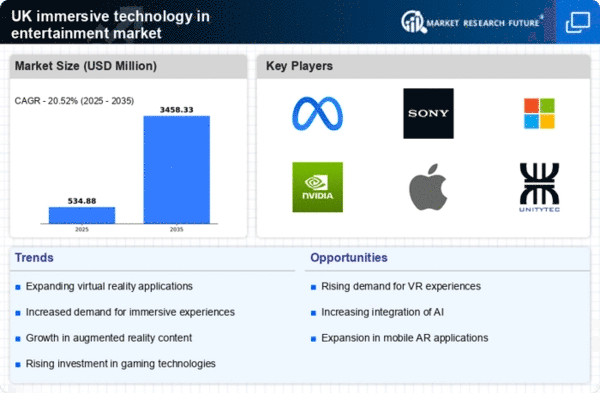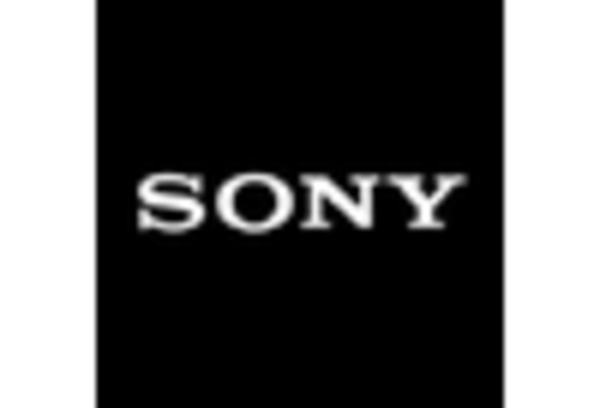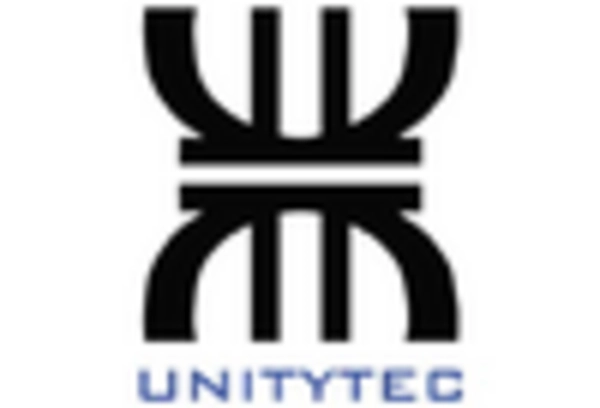Rise of Streaming Platforms
The rise of streaming platforms is reshaping the landscape of the immersive technology-in-entertainment market. With the increasing consumption of digital content, platforms are exploring immersive formats to attract and retain subscribers. In the UK, the number of streaming subscribers is expected to surpass 30 million by 2026, creating a substantial market for immersive content. This shift encourages content creators to experiment with VR and AR formats, offering viewers unique experiences that traditional media cannot provide. As streaming services continue to evolve, the demand for immersive content is likely to grow, driving further innovation and investment in the immersive technology-in-entertainment market.
Growing Popularity of Esports
The rise of esports is significantly impacting the immersive technology-in-entertainment market. With millions of viewers and participants, esports events are increasingly incorporating immersive technologies to enhance viewer engagement. The UK esports market is projected to reach £1 billion by 2025, indicating a robust growth trajectory. This growth is accompanied by the integration of VR and AR experiences, which provide fans with unique perspectives and interactive elements during live events. As esports continues to gain traction, the demand for immersive experiences is likely to increase, driving further investment in the immersive technology-in-entertainment market. This trend suggests that immersive technologies will play a pivotal role in shaping the future of entertainment, particularly in the competitive gaming sector.
Technological Advancements in Hardware
The immersive technology-in-entertainment market is experiencing rapid growth due to advancements in hardware. Innovations in virtual reality (VR) headsets, augmented reality (AR) devices, and motion tracking systems are enhancing user experiences. For instance, the introduction of high-resolution displays and improved field of view in VR headsets has led to a more engaging environment for users. The UK market has seen a surge in demand for these devices, with sales projected to reach £1.5 billion by 2026. This growth is driven by both consumer interest and the increasing adoption of immersive technologies in various entertainment sectors, including gaming and live events. As hardware continues to evolve, it is likely to further stimulate the immersive technology-in-entertainment market, attracting new users and applications.
Expansion of Theme Parks and Attractions
The expansion of theme parks and attractions utilizing immersive technology is a notable driver for the immersive technology-in-entertainment market. In the UK, several theme parks are investing heavily in immersive experiences, integrating VR and AR into rides and attractions. This trend is expected to attract more visitors, with projections indicating a 20% increase in attendance at parks that adopt these technologies. The immersive experiences not only enhance the thrill of rides but also create memorable interactions for guests. As competition among theme parks intensifies, the incorporation of cutting-edge immersive technologies is likely to become a standard practice, further propelling the growth of the immersive technology-in-entertainment market.
Increased Investment in Content Creation
Investment in content creation is a crucial driver for the immersive technology-in-entertainment market. As more companies recognize the potential of immersive experiences, funding for the development of VR and AR content has surged. In the UK, the market for immersive content is expected to grow by 30% annually, reflecting a strong interest from both established studios and independent creators. This influx of capital allows for the production of high-quality, engaging content that can captivate audiences. Furthermore, partnerships between technology firms and content creators are becoming more common, leading to innovative projects that push the boundaries of storytelling. This trend not only enhances the quality of offerings but also expands the audience base, thereby propelling the immersive technology-in-entertainment market forward.
















